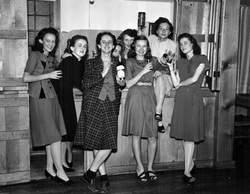Please be sure to add your text selection for others to view!
 While listening to CPR today, I heard an interesting interview that I want to share. Ryan Warner interviewed Boulder author TaraShea Nesbitt about her new book "The Wives of Los Alamos." At one point, Warner asked Nesbitt to discuss her decision, as an author, to write using "we" as opposed to some other pronoun. She gave a very interesting answer, which I think offers a great opportunity to consider author's craft in textual analysis. When asking students to dig into text, particularly around author's craft and structure, it is important to provide lots of support and examples. Question stems such as, why do you think the author chose to write using the pronoun "we" instead of "I, you, they, etc?;" what effect does this structural decision have on you as the reader?; what message does the author want to get across through this intentional selection of words? all support students as they consider that author's are very intentional about the words they chose in an effort to convey certain meaning, messages, etc. When students look at choices made over the course of a text, they begin to draw conclusions around the tone, mood, theme, etc of that text and certainly gain a better understanding of how to approach analysis of complex material. Take some time to enjoy this interview and consider how this kind of discussion could make it into your student's conversations around text, point of view and craft and structure. http://www.cpr.org/news/story/new-book-chronicles-los-alamos-wives-heading-west-unknown As you are writing your lesson and teaching it with students, please be sure to reflect on your experiences! Be sure to comment on at least two other posts prior to our September meeting date! We can't wait to see all of the fabulous lessons and instructional strategies!
|
Archives
September 2015
Think, Question, Discuss, Act
Categories
All
|
 RSS Feed
RSS Feed
